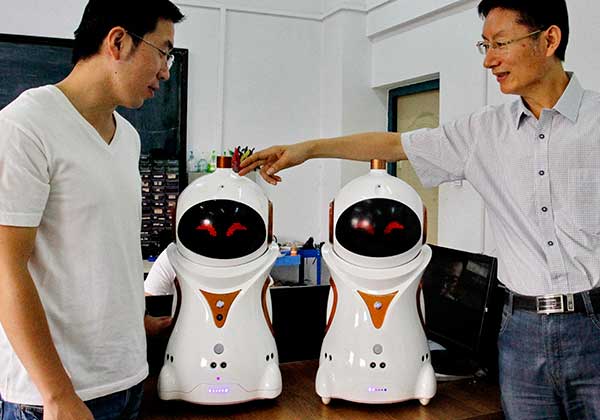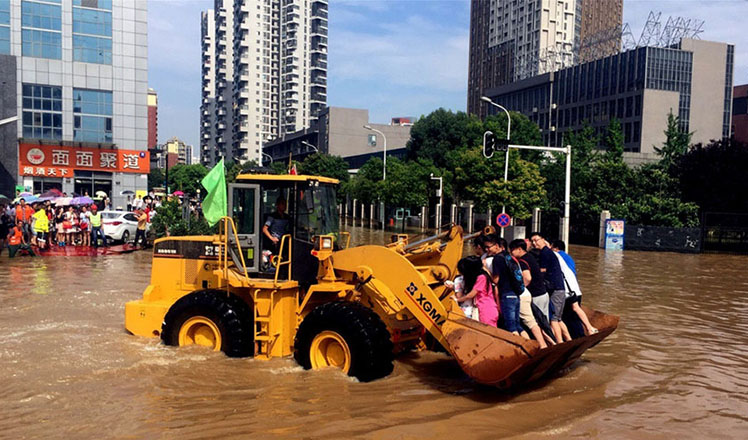Service robot for elderly promising
Updated: 2016-07-11 09:02
By Ju Chuanjiang and Zhao Ruixue in Jinan(China Daily)
|
||||||||
 |
|
Professor Zhou Fengyu (right) displays the newly developed robots with his colleague.[Ju Chuanjiang/China Daily] |
An intelligent robot that helps the elderly detect intruders, gas leaks and other dangers is expected to be on the market by year's end at an affordable price, according to its developer.
"It is small but complete in functions," said Zhou Fengyu, director of Shandong University's Cloud Intelligent Robotics Laboratory.
The 62-millimeter-high service robot, dubbed Da Zhi or "smart", is the product of three years of hard work from Zhou and a team of 20 at the university.
It has visual and auditory sensors, utilizes facial recognition technology and can also detect odors - as well as being able to learn and share via a cloud computing platform.
If it identifies a person as a stranger, the robot will send a photo of the potential intruder to its owner.
It also can detect its owner's trips and falls, and will send photos or videos of the incident to an emergency contact.
"The various sensors installed on the robot enable it to measure temperature and humidity, detect gas if there's a leak, and avoid obstacles so that it can move smoothly around the house," Zhou said.
With a recommended retail price estimated to be below 10,000 yuan ($1,496), it should be affordable for many families, he added.
Having already secured six technical patents, Zhou and his team are now working on giving the Da Zhi robots the ability to carry out diagnostic checks on themselves.
"We are trying to enable them to test themselves and report faults to their owners, so they can stop working before they make mistakes," he said.
The service robots will be field-tested with several families before going to market.
"We are developing customized services such as making the robot's voice sound like a child's," said Zhou, who has two decades of experience developing industrial, medical and other kinds of robots.
"People have high expectations for service robots, but there is still a lot of work to do to enrich their functions and service details," he said.
China's elderly population, defined as those aged 60 and above, reached 169 million last year, according to the China National Committee on Aging.
Experts have estimated that this number is likely to reach 300 million by 2030, and more than 200 million of them will live alone.
Qiao Hui, deputy head of the Robot Group of Harbin Institute of Technology, said there is a huge market for service robots in China.
"The internet and internet of things also provide good opportunities for the development of service robots," Qiao said.
The internet of things refers to a network of devices, vehicles and other objects with software or sensors that allow them to communicate.
Robots under development elsewhere include one from another university in Shandong designed to provide messages based on traditional Chinese medicine.
It is expected to hit the market this year. Another is programmed to play with pets while cleaning the floor.
- Eid al-Fitr celebrated worldwide
- Swedish PM looking at tightening laws after festival sex attacks
- British PM race cut to 3 hopefuls as 2 contenders exit contest
- Chinese herbalists offer free US treatment
- Obama praises Hillary's judgement hours after FBI's censure
- Rio mayor tells Olympic visitors: 'Don't expect New York or London'

 Ronaldo-less Portugal wins Euro 2016 title
Ronaldo-less Portugal wins Euro 2016 title
 Chinese navy fleet joins RIMPAC 2016 open day
Chinese navy fleet joins RIMPAC 2016 open day
 Staying cool at the zoo amid Shanghai heat wave
Staying cool at the zoo amid Shanghai heat wave
 Tibet through the lens of China Daily reporter
Tibet through the lens of China Daily reporter
 On the front lines of the flood battle in China
On the front lines of the flood battle in China
 Griezmann scores twice to lift France into Euro final
Griezmann scores twice to lift France into Euro final
 Life goes on in flooded Wuhan
Life goes on in flooded Wuhan
 Paper cutouts offer a new view of world landmarks
Paper cutouts offer a new view of world landmarks
Most Viewed
Editor's Picks

|

|

|

|

|

|
Today's Top News
Ministry slams US-Korean THAAD deployment
Two police officers shot at protest in Dallas
Abe's blame game reveals his policies failing to get results
Ending wildlife trafficking must be policy priority in Asia
Effects of supply-side reform take time to be seen
Chinese State Councilor Yang Jiechi to meet Kerry
Chinese stocks surge on back of MSCI rumors
Liang avoids jail in shooting death
US Weekly

|

|







